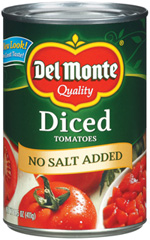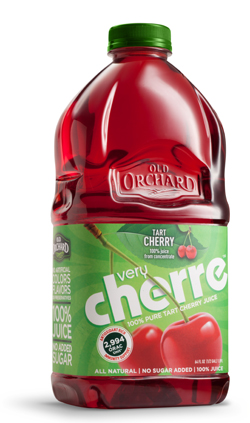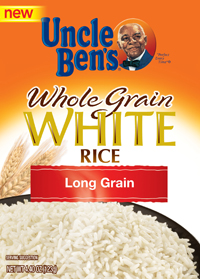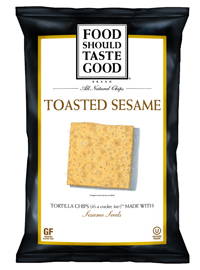 We love to try new foods. Some are great. Some don’t measure up and some become staples in our kitchen. See what you think.
A number of major food manufacturers have made an effort to lower the amount of sodium in their brands. Reducing salt (a major source of sodium) in foods is challenging both from a food processing standpoint and from a consumer acceptance position.
Research has shown that for some groups of food the consumer can taste a sodium reduction as small as 8%… … Read More
We love to try new foods. Some are great. Some don’t measure up and some become staples in our kitchen. See what you think.
A number of major food manufacturers have made an effort to lower the amount of sodium in their brands. Reducing salt (a major source of sodium) in foods is challenging both from a food processing standpoint and from a consumer acceptance position.
Research has shown that for some groups of food the consumer can taste a sodium reduction as small as 8%… … Read More
Vitamin D has been in the news a great deal lately. Canada has recenlty increased the daily recommendation and experts worldwide believe most of us are not getting enough of this important vitamin. More and more foods are being fortified with vitamin D. The fortification occurs in two forms: D2 from yeast and D3 from … Read More
Flaxseed oil and pregnancy may not mix. For pregnant women eating flaxseed oil the rate of premature births is 12%. The normal rate is 2% to 3%. Women who eat flaxseeds don’t have an increased risk. … Read More
 We love to try new foods. Some are great. Some don’t measure up and some become staples in our kitchen. See what you think.
Forget acai, pomegranates and gogi berries. US grown tart cherries, available year round, are tiny nutrition powerhouses. Over 75 research studies dating from the 1950s have shown that compounds in cherries possess anti-inflammatory, anti-aging, and anti-cancer properties. The pigment that gives cherries their bright red color has extraordinary antioxidant capacity.
The use of oxygen in the body is critical to life. But, in the process free radicals are formed. These renegade oxygen compounds can damage the body and promote disease. Antioxidants, natural plant compounds, deactivate damaging free radicals and protect the body… … Read More
We love to try new foods. Some are great. Some don’t measure up and some become staples in our kitchen. See what you think.
Forget acai, pomegranates and gogi berries. US grown tart cherries, available year round, are tiny nutrition powerhouses. Over 75 research studies dating from the 1950s have shown that compounds in cherries possess anti-inflammatory, anti-aging, and anti-cancer properties. The pigment that gives cherries their bright red color has extraordinary antioxidant capacity.
The use of oxygen in the body is critical to life. But, in the process free radicals are formed. These renegade oxygen compounds can damage the body and promote disease. Antioxidants, natural plant compounds, deactivate damaging free radicals and protect the body… … Read More
Literacy is the ability to read and write, but health literacy is the capacity to process information so that we can understand health facts and make health decisions. A person that is literate can have very low health literacy. It’s estimated that only 12% of US adults have a proficient health literacy level. In simple … Read More
Dark soy sauce may slow down heart disease. It is 10 times more effective than red wine and 150 times more potent than vitamin C, because dark soy sauce is rich in antioxidants which protect human cells from damage. But, all types of soy sauce are high in sodium, so indulge lightly. … Read More
 We love to try new foods. Some are great. Some don’t measure up and some become staples in our kitchen. See what you think.
We are encouraged to eat half of our carb servings per day as whole grains. Few American meet this guideline and less than 5% of us get enough fiber daily. But, most of us love rice, especially white rice.
Uncle Ben’s has developed whole grain white rice that cooks in 10 minutes, half the time of brown rice… … Read More
We love to try new foods. Some are great. Some don’t measure up and some become staples in our kitchen. See what you think.
We are encouraged to eat half of our carb servings per day as whole grains. Few American meet this guideline and less than 5% of us get enough fiber daily. But, most of us love rice, especially white rice.
Uncle Ben’s has developed whole grain white rice that cooks in 10 minutes, half the time of brown rice… … Read More
Eating more fish, poultry, nuts, and lowfat dairy products instead of red meat may lower your risk for heart disease. Researchers who followed over 84,000 women aged 30 to 55 in the Nurses’ Health Study showed that women who swapped 1 serving of red meat for 1 serving of nuts reduced their heart disease risk … Read More
What the researchers are saying: You can lose weight on either a low carb diet or a high carb diet. The key to success isn’t which regimen you follow. It’s avoiding overeating and adding exercise for faster results. … Read More
 We love to try new foods. Some are great. Some don’t measure up and some become staples in our kitchen. See what you think.
Food Should Taste Good is a quirky name for a company that produces 14 different flavors of tortilla chips. The chips are baked first and than cooked in sunflower oil. The baking process allows for the use of less oil while achieving a crispy tortilla chip… … Read More
We love to try new foods. Some are great. Some don’t measure up and some become staples in our kitchen. See what you think.
Food Should Taste Good is a quirky name for a company that produces 14 different flavors of tortilla chips. The chips are baked first and than cooked in sunflower oil. The baking process allows for the use of less oil while achieving a crispy tortilla chip… … Read More
 We love to try new foods. Some are great. Some don’t measure up and some become staples in our kitchen. See what you think.
A number of major food manufacturers have made an effort to lower the amount of sodium in their brands. Reducing salt (a major source of sodium) in foods is challenging both from a food processing standpoint and from a consumer acceptance position.
Research has shown that for some groups of food the consumer can taste a sodium reduction as small as 8%… … Read More
We love to try new foods. Some are great. Some don’t measure up and some become staples in our kitchen. See what you think.
A number of major food manufacturers have made an effort to lower the amount of sodium in their brands. Reducing salt (a major source of sodium) in foods is challenging both from a food processing standpoint and from a consumer acceptance position.
Research has shown that for some groups of food the consumer can taste a sodium reduction as small as 8%… … Read More












